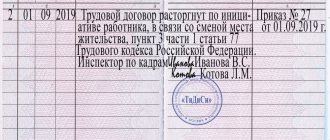Basic Concepts
The probationary period, according to the Labor Code of the Russian Federation, is considered to be the period of time during which the manager checks the working qualities of his new subordinate. This includes:
- Ability to cope with the assigned task;
- General discipline;
- Compliance of the employee’s skills with his professional education.
For citizens holding non-managerial positions, this period cannot last longer than 90 days. But for chiefs, their deputies and persons related to government agencies, Art. 70 of the Labor Code of the Russian Federation provides for a probationary period of up to six months.
In this case, the days on which the subordinate was absent from the workplace (due to vacation, illness, family circumstances, etc.) will be taken into account separately, thereby extending his initial introductory period. In case of violation of labor discipline during the internship, the same responsibility is provided as for full-fledged employees of the enterprise.
The only differences between the probationary period and the standard working regime are a reduced number of working hours per day and a reduced wage rate. Among the exceptions to which internship does not apply under the Labor Code of the Russian Federation are:
- Citizens who came as a result of competitive selection;
- Pregnant;
- People raising a child under 1.5 years of age;
- Minors;
- Students;
- Applicants, provided that this vacancy is of secondary importance to them;
- Seasonal workers, provided they are employed for a period of less than 2 months.
It is important to know! In this case, the employer must indicate in the contract that the citizen will undergo a temporary internship (the duration of this period does not have to be mentioned). Is it possible to resign during a probationary period without working, and how best to do this from the point of view of the law, we will find out later in the article.
Employee statement
The employee must inform the manager about his departure three days in advance. Notification must be in writing. In practice, this is the employee’s statement. The current norms have not established a clear standard for treatment of this nature, that is, the content is arbitrary. However, the text must include all information that is relevant to the issue.
This includes:
- The name of the organization to which the appeal is sent. The location address is indicated if the application will be sent by post.
- Information about the manager who will consider the application.
- Information about the employee - name, position. Place of residence is indicated if the application is sent by mail.
- Direct request to terminate the employment relationship.
- Reason for leaving. This item is not a requirement.
- Planned date of dismissal. In this case, you need to indicate the number, regardless of whether the person wants to leave early or after three days.
- Signature of the initiator and date of application.
The completed document must be handed over to the head of the company. This responsibility is assigned to the employee, in case of initiative on the part of the latter. You can do this in several ways:
- Hand over the appeal personally to the boss or his assistant. This option will allow the person to verify that the request has been delivered.
- Send by mail. This method eliminates the need for the worker to come to the manager himself.
- Enlist the services of your legal representative. In this case, the authorized person, when contacting the company, must have a passport proving his identity, as well as a notarized document confirming the authority of the applicant.
- Submit an application online. To do this, you will need to have at your disposal the necessary technical means to convert the letter into electronic format.
Any of the options is used at the discretion of the initiator. The main thing is that the appeal is delivered to the addressee.
Reasons for dismissal during probationary period
Most often, trainees are removed from their duties due to poor quality of work or non-compliance with the requirements. But few people know that you can quit without serving a probationary period and due to other circumstances, such as:
- Unsuitable working conditions;
- Late payment of wages;
- Extending the working day without agreement with subordinates;
- Insufficient duration or complete absence of a break;
- Deterioration of health.
You can also leave the company during the internship at your own request. But management must be notified of such intentions no later than 3 days before leaving. This will be the period of service established by law upon dismissal during the probationary period. The authorities, at their discretion, can dismiss the citizen before the end of these three days.
When does dismissal occur without work?
However, it is possible to do without even three days of work . One day it is possible to resign by agreement of the parties - both during the probationary period and while on the staff of the organization. This right is specified in Art. 78 Labor Code of the Russian Federation. In addition, based on the content of Art. 70 of the Labor Code of the Russian Federation, it can be stated that even if there is a probationary period, you will be subject to laws, provisions of the Labor Code, regulations and labor law norms.
You can quit without work if you:
- You will be enrolled in a university or other educational institution and will no longer be able to continue working;
- Will you retire?;
- Violate labor laws or local acts of labor and collective agreements;
- Move to another place or region for work;
- You will be forced to go abroad to work in the direction;
- Forced to move to another area for medical reasons;
- You are caring for a child under 14 years of age, a disabled person or a sick family member;
- Are you a pensioner or a pregnant woman?;
- Are you a parent or guardian of a child under 14 years of age?.
Thus, rehearsal is not always necessary. You are obligated to notify your manager, but do this no later than a certain period of time - no, if you have a good reason for resigning as soon as possible, and even better - documents confirming this reason. Therefore, it all depends on you and your circumstances.
Legality of assigning work
A two-week working period upon dismissal is provided for by the Labor Code as a penalty for termination of a contract. Therefore, both the employee and the manager must comply with it. But depending on the circumstances of the subordinate’s removal, responsibility for ignoring the technical regulations may be assigned to:
- An employee of the enterprise - when leaving at his own request;
- Bosses - when a citizen is dismissed at the initiative of the employer.
That is, if a person decides to leave his position due to personal circumstances, then the Labor Code of the Russian Federation obliges him to work for the period established by law for early termination of the contract or to pay material compensation to the enterprise.
It is important to know! But if a subordinate is removed from his duties at the request of management, the detention cannot come into force. Moreover, this also applies to people on a probationary period, with the difference that for them the duration of work after submitting an application for payment is three days instead of two weeks.
Notice period for dismissal
The concept of a working period in this case is informal. This period represents the time of preliminary notification by the initiator of the other party about the upcoming termination of the employment relationship.
Most people don't realize how much work they'll have to do before they leave. According to general rules, the calculation period depends on who initiates the dismissal procedure. If such an intention is expressed by an employee, then the maximum period of his work before being released from his position will be two weeks. In the case of a manager, everything is much more complicated, since the reason for the employee’s departure matters. For example, during the liquidation of a company, a person can work up to two actual months, and in the case of violation of labor discipline - one month maximum.
Workers undergoing preliminary testing have a special status due to the fact that they are not permanent until the end of the test.
Therefore, the longest period a person can work before leaving is three days. Moreover, the calculation in this case occurs in actual, not working days. That is, even if the day of dismissal falls during a non-working period, this will not increase the duration of the employment relationship. The initiating party in such a situation does not matter.
Dismissal procedure
The dismissal process is regulated in accordance with the law. If a citizen decides to resign during the probationary period without working, then for this he needs:
- Notify your manager of your intentions (the Labor Code sets a period of 3 days for such notifications, although a subordinate can send it a little earlier);
- Write a letter of resignation of your own free will (if the subordinate agreed in advance with the boss about the absence of a three-day trial after the calculation, then there is no need to indicate the reason for his removal from position on the form. But if he receives a refusal, the employee will have to refer to any violations on the part of the manager, which forced him to leave his current place of employment);
- Wait for the official dismissal order (the director is given no more than 1-2 days to create it).
At the same time, leaving on your own initiative during the trial period will not be paid, as is the case when calculating full-time employees. If the removal of a subordinate from official duties is carried out at the request of the employer, then the procedure will change somewhat:
- The boss issues a dismissal order, which states the reason for the payment and the exact date of leaving the enterprise;
- The mentioned document is signed by the HR department, and appropriate changes are made to the work schedule;
- If within three days after the order is issued, the employee does not file a complaint against management, then he will be fully paid (otherwise, the case will be considered by the court, after which the plaintiff has a chance to remain in his previous position).
It is worth noting that dismissal without working on a probationary period at the request of the employer occurs without the consent of the trade union (if there is one at the enterprise). And this will not be considered a violation from the point of view of the Labor Code.
Termination of an employment contract
According to the general provisions in force, even before the expiration of the preliminary examination period, the professional cooperation may be terminated.
A manager can initiate such a process if for some reason he is not satisfied with the quality of the specialist’s work. In turn, the employee can leave of his own free will if he decides that the position is not suitable for him.
That is, in this situation, both parties to the labor relationship have the same opportunities.
At the initiative of the employee
During the probationary period, an employee can resign from the organization at his own request.
This happens in a situation when a person comes to the conclusion that the proposed position will not suit him in the future. Moreover, the current legislation does not define a list of such reasons, that is, the decision is made by the employee solely for his own reasons. The reasons for this intention may be lower earnings compared to what was promised, insufficient provision of necessary equipment and funds, biased attitude on the part of the company’s management, remoteness of the person’s place of residence from work, lack of additional guarantees and compensation, according to local regulations.
At the initiative of the employer
The employer's initiative can also serve as a reason for terminating the employment relationship with the employee. This happens if the test results do not suit the head of the organization. The law does not specify the list of such comments. In practice, these include untimely execution of management orders, poor quality of work, frequent errors and inaccuracies in the process of professional activities, insufficient level of experience and knowledge, irresponsible attitude to the performance of duties in the position held. It should be noted that even a violation of internal regulations can serve as a reason for dismissing an employee as having failed a preliminary check.
Is it possible to quit on the day you submit your application?
According to Art. 80 of the Labor Code of the Russian Federation, working off comes into force for all employees who quit of their own free will, except for the following cases:
- Pensioners (60 years old for women, and 65 years old for men);
- Military personnel on contract or military service;
- Full-time students.
For the listed categories, mandatory two-week or three-day (for trainees) work cannot be applied by law. Ordinary citizens can avoid overtime work by leaving the enterprise on the day of writing the application only using the following two options:
- Agree on the cancellation of work with management (in most cases, employers meet their former employees halfway and do not insist that they comply with Article 80 of the Labor Code of the Russian Federation);
- Identify and prove violations of the employment contract by management (under such circumstances, Article 80 of the Labor Code of the Russian Federation does not come into force).
Advice! If none of the above methods helped you, then you can try to quit during the probationary period on the day you write the application, citing the fact that the employer is limiting your freedom. After all, this is a direct violation of the Constitution of the Russian Federation, for which very serious responsibility is provided.
Procedure for establishing the test
Establishing a probationary period is the right, but not the obligation, of the employer. The main purpose of such an event is to test the professional skills, knowledge and personal qualities of the applicant for their compliance with the interests of the company. At the same time, for the applicant, this is an opportunity to evaluate the content of the job, corporate culture, team and compare the impressions received with their expectations.
Most of the parameters of the procedure for establishing a probationary period are set out in Art. 70 Labor Code of the Russian Federation. It sets deadlines for checking an employee:
- No more than 3 months for all employees;
- Up to six months - for managers, chief accountants and their deputies;
- Up to 2 weeks – if a fixed-term contract is concluded for a period of 2 to 6 months;
- From 3 to 12 months – for civil servants.
The condition for assigning a probationary period is mandatory in the employment contract with the hired employee. If he refuses to undergo the verification period, and the employer insists on this, then the employment contract is not concluded, since no agreement has been reached on its essential point. The period allotted for checking a candidate for compliance does not include periods of his actual absence from work.
The Labor Code of the Russian Federation also contains a list of personnel for whom it is prohibited to establish a probationary period.
Increasing the working period
According to the Labor Code of the Russian Federation, during a probationary period, you can quit without working out or with a clearly established period of overtime work: 14 days for regular workers and 3 days for trainees. Managers cannot increase this time period under any circumstances. The only exception, when the duration of work exceeds the unified norm, is when this condition is agreed upon in the contract. The boss cannot include such changes after the person has started work.
We found out how many days subordinates need to work during dismissal during a probationary period, and what legal options for evading it exist today. In conclusion, it remains to be added that trainees have the same right to appeal to the trade union committee and the court, if violations of the Labor Code are detected by their superiors, as ordinary employees. Therefore, you need to treat people undergoing a trial period with respect.
Reasons for dismissal during the probationary period
The law does not limit in any way the possibilities for terminating the relationship between the company and the employee during the probationary period. As with other conditions of employment relations, dismissal can occur:
- At the initiative of the employee;
- By agreement between the participants in the labor relationship;
- At the initiative of the employer.
Often, separation occurs when the candidate did not meet the employer's expectations and, as a result, failed the test. This dismissal option also falls into the category of those carried out at the initiative of the employer (read more here: dismissal during a probationary period).










